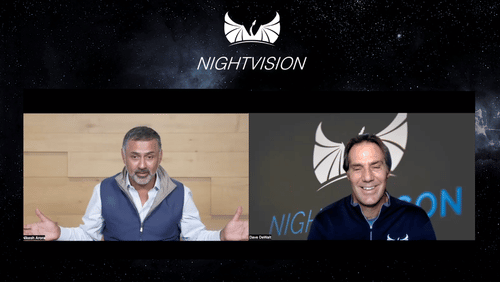On August 24, NightDragon welcomed Palo Alto Networks Chairman and CEO Nikesh Arora to our monthly NightVision series. Nikesh is a technology industry luminary who has driven an impressive growth story at Palo Alto Networks since joining four years ago, one that has led the company to become the largest cybersecurity company by market cap, currently standing around $56 billion, and orchestrated a successful cloud transition to its product set.
Our NightVision event was moderated by NightDragon’s Founder and Managing Director Dave DeWalt, who led a discussion on Palo Alto Network’s journey as a company and successful transformation to cloud security. They also discussed how Arora approaches leadership and building a successful culture, as well as what he’s watching in the current threat landscape.
Here are some takeaways from the conversation:
- Business Remains Strong for Essential Cyber Companies – Palo Alto Networks, which announced its Q4 earnings this week shortly before the NightVision event, announced revenue grew 27% year over year to $1.6 billion and billings grew 44% to $2.7 billion. As part of that, the company significantly grew its next-generation security portfolio 60% to $1.89 billion.
- Integration is the Future – In the age-old debate around best of suite vs. best of breed, Arora said Palo Alto Networks is building a platform to have both. The company has acquired several companies to fill out that platform in key categories, resulting in the company being recognized as a leader in 11 different categories by Gartner. “We’re trying to give the integrated platform to the customer, so they don’t have to go chase different solutions,” Arora said. “Products that talk to each other to solve your security problem get a better security posture,” he said.
- On-Premises Firewalls Aren’t Dead – Amongst an overall strong quarter for the company in Q4 and strong growth for cloud, Palo Alto Networks continued to see demand rise for its firewall hardware business. That business line grew 32% year over year, according to the company’s filings, and the company continues to see demand, Arora said. “The rumors of the [death of the firewall] are greatly exaggerated,” he said.
- IoT Security Needs to be at Every Company – The network is expanding, with billions of devices connecting across IoT and OT. Companies need visibility into what devices are connecting to their network, what types of devices those are, what those devices do, and then protect, segment and classify them, Arora said. He said Palo Alto Networks has built IoT capabilities into its firewalls to help companies address this, for instance.
- Shift Left is Key to Ensuring Developer Security – Organizations need to have a verified strategy on the developer side to ensure developer security is consistent across the organization, including for open-source tools. Palo Alto Networks completed its acquisition of Bridgecrew in March to address this challenge, an area that Arora called “extremely strategic for us” and said it was the fastest adopted module in its cloud security platform in its Q4 earnings.
- Biggest Threat Inflection is Attackers Going from Hobby to Profession – Over the last two to three years, Arora said the biggest inflection point he’s seen in the threat landscape is a transition from hacking as a hobby to a profession, which has led to increased severity and frequency of attacks. “I think that’s a fundamental shift, which I think takes you away from this just being a super cycle to this becoming the norm. I don’t think this is going to go away,” he said.
- Cybersecurity Companies Can’t Lag on Innovation – With hundreds of new startups founded every year, there isn’t a shortage of innovation in cybersecurity. Yet, companies must constantly evaluate if their product continues to solve the problems it needs to for their customers, Arora said. “Technology companies fail once their products become irrelevant. It sounds so simple, but if you look at the history of Silicon Valley and tech, you can trace every tech company’s market cap to the quality and their persistence of their product. When leadership stops paying attention to the product and the product decays, customers eventually leave and go somewhere else,” he said. Companies like Palo Alto Networks, who had to navigate this technical debt when he first joined four years ago, can navigate this dynamic by focusing on the future and positioning for those dynamics, such as cloud.
- Building Strong Company Culture is Intentional –Arora said he worked hard to be intentional about his leadership style and the culture he built at Palo Alto Networks. “I think that has been the biggest self-development opportunity that I’ve been able to have in the last four years,” he said. Steps he took included surveying all employees with a culture questionnaire and personally reading every comment. He said he also dedicates a window every week – no matter what is going on – to sit down with 30 to 40 employees for an open discussion. He said the pandemic only intensified the importance of this.
A full recording of the event can be found above. To view NightDragon’s other NightVision events, visit our Events page.
